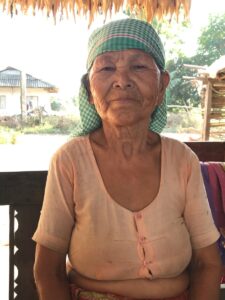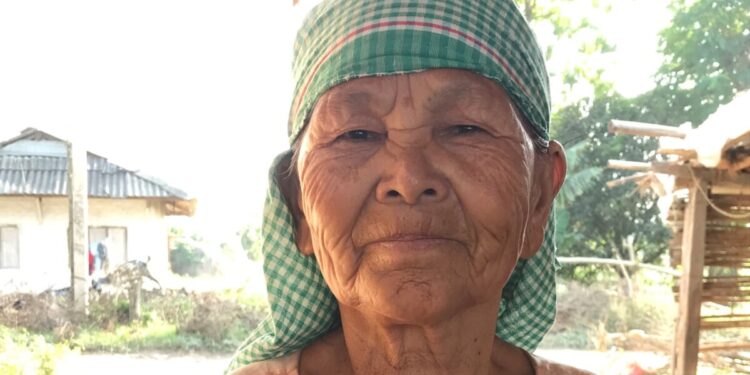Ms. Sita Pahari aged 68, permanent residence of Gairigaun village of Lalbandi Municipality, 3 of Sarlahi district. She is a single mother of two sons and a daughter. Dalit Christians are most vulnerable to caste-based violence but are not protected by the Caste-Based Discrimination and Untouchability (Offence and Punishment) Act, 2011 and the Nepali Constitution. Likewise, Nepal’s Criminal code 2017 includes provisions that have been interpreted as prohibiting conversion from one religion to another. It also criminalizes proselytism.
My birth place is in Bagmati, a northern part of the Sarlahi district. We received the blessing of lord Jesus in 1979. After receiving the blessing, we faced various types of discrimination due to our religious belief and low caste status. Next year, in 1980 we shifted from that area due to life threat by the high caste Hindu people, and came to Lalbandi. 
During that time, there were no houses around our small hut. People rarely used to travel throughout our area. We were almost alone in the middle of the settlement. Probably, our family was the first to follow Jesus throughout the whole village.
I still remember those days, where people denied us permission to take water from public wells. We used to wait a long time to collect a bucket of water. Upper caste and Hindu people, not only adults but also children also used to collect water first, and ask us not to come close to well. Many times, they forced me to go far from the well, and used foul speech on me as being a Dalit woman and a Christian.
We were supposed to be lower and untouchable by the superior and were treated like animals. But by the grace of Jesus, hard times flew and we kept believing. It’s because of belief, hope and love. Now we are happy and living a happy and prosperous life. But, the discrimination against Dalit Christians is still rampant. I do not understand how the water will be impurely touched by us? Is the air being pure passing touching us?
Some observers assert that prejudices related to the caste system drive many lower-caste Hindus to embrace Christianity, though to date there is no evidence to support the claim. Although Nepal outlawed the caste system in 1962 and made the practice of “untouchability” a criminal offense in 2001, discrimination based on caste remains prevalent. In particular, castes that had been classified as “untouchable” or Dalit, continue to suffer from significant discrimination, marginalization, and harassment, especially in rural areas of Nepal.
Additional Information
Nepal is made up of dozens of ethnic and caste groups, more than 60 percent of Christians come from only eight ethnic or caste groups. Converts to Christianity in Nepal are drawn not only from lower ethnic and caste Hindu groups such as the Santhal Satar (5.8 percent), but also, and perhaps predominantly from other religious and ethnic groups who practice Buddhism, Kirati, or forms of the indigenous animist religion.
Nepal’s new 2017 criminal code includes provisions that have been interpreted as prohibiting conversion from one religion to another. These provisions replace those that had already existed in the Country Code (Muluki Ain), 1963 (commonly known as the “Penal Code”).[1] The Country Criminal Code of 2017 criminalizes proselytism. The applicable provision states, “No one should convert a person from one religion to another religion or profess their own religion and belief with similar intention by using or not using any means of attraction and by disturbing the religion or belief of any ethnic groups or community that’s been practiced since ancient times.”[2] A conviction for this offense carries a punishment of imprisonment of five years and a fine of fifty thousand rupees.[3]
According to the 2017 civil code, the punishment this law stipulates is five years’ imprisonment and a 50,000 rupee fine for converting someone from one religion to another, and three years’ imprisonment for insulting religious belief or inciting religious or caste conflict. The law also subjects foreign nationals convicted of these crimes to deportation. These anti-conversion laws are perceived to be aimed specifically at Christian communities, the members of which are increasingly harassed and arrested under their authority.[4]
Christian minority communities reported to USCIRF in November 2016 that local government and police officials were interpreting a constitutional prohibition against conversion to criminalize even non-coercive proselytization, which, of course, limits the rights of followers of religions that prescribe proselytization.[5] Christian communities also noted that since the Constitution’s enactment, they have been increasingly harassed, and in some cases detained by local governmental officials, due to allegations they were converting Hindus, especially Dalit Hindus.[6] Their places of worship have also been attacked and even bombed.[7]
Constitutional Articles Relevant to Religious Freedom
The Constitution of Nepal, 2015, recognizes the “secular” nature of the State. It guarantees the right of individuals to freely “profess, practice and preserve” their religion, and prohibits discrimination on a number of grounds, including on the basis of one’s religion. Article 18 of the Constitution has the provision of right to equality under which all citizens are equal before law and no one shall be discriminated on the basis of origin, religion, race, caste, tribe, sex, physical conditions, disability, health condition, matrimonial status, pregnancy, economic condition, language or geographical region, or ideology or any other such grounds as a fundamental right.
| Core International Human Rights Treaties & their Optional Protocols accession / ratification by the government of Nepal | Date of Accession / Ratification by Nepal |
| Convention against Torture and Other Cruel Inhuman or Degrading Treatment or Punishment | Acceded on May 14, 1991 |
| International Covenant on Civil and Political Rights | Acceded on May 14, 1991 |
| Second Optional Protocol to the International Covenant on Civil and Political Rights Aiming to the Abolition of the Death Penalty | Acceded on March 4, 1998 |
| Convention on the Elimination of All Forms of Discrimination against Women | Ratified on April 22, 1991 |
| International Convention on the Elimination of All Forms of Racial Discrimination | Acceded on January 30, 1971 |
| Convention on Economic, Social and Cultural Rights | Acceded on May 14, 1991 |
| Convention on the Rights of Persons with Disabilities | Ratified on September 14, 1990 |
| Optional Protocol to the Convention on the Rights of the Child on the Involvement of Children in Armed Conflict | Ratified on January 3, 2007 |
| Optional Protocol to the Convention on the Rights of the Child on the Sale of Children for Child Prostitution and Child Pornography | Ratified on January 20, 2006 |
| Convention on the Rights of Persons with Disabilities | Ratified on May 7, 2010 |
The Constitution of Nepal establishes Nepal as a “secular” state. As noted above, an explanatory clause included in Article 4(1) of Nepal’s Constitution states, “For the purposes of this Article, ‘secular’ means religious, cultural freedoms, including protection of religion, culture handed down from the time immemorial.”
Article 26 of the Constitution further stipulates that every person has the right to profess, practice, and protect his or her religion. However, Article 26(3) also states, “No person shall, in the exercise of the right conferred by this Article, do, or cause to be done, any act which may be contrary to public health, decency and morality or breach public peace, or convert another person from one religion to another or any act or conduct Laws Relevant to Religious Freedom.
The Constitution of Nepal, 2015 has National Inclusive Commission in its Part-29 which will focus on protecting rights and welfare of indigenous communities, Khash Arya, Madhesi, Tharu, Muslim, Dalits, persons with disabilities, senior citizens, laborers, peasants, marginalized and minority communities, people of Karnali region and economically disadvantaged people. Nepal has also ratified many international covenants and treaties through which it has committed itself to protect human rights of Dalits and religious minorities. However, government’s commitment and legal provisions are only the showpiece to show the international communities.
References
[1] Nepal Law Commission, The Muluki Ain (General Code), https://nepalconflictreport.ohchr.org/files/docs/1963-04-12_legal_govt-of-nepal_eng.pdf.
[2] Andrew Korybko, Nepal’s Anti-Conversion Law is more about National Security than Christianity, Global Research, August 28, 2018, https://www.globalresearch. ca/nepals-anti-conversion-law-is-more-about-national-security-than-christianity/5652076.
[3] Kate Shellnut, “Nepal Criminalizes Christian Conversion and Evangelism,” Christianity Today, October 25, 2017, https://www.christianitytoday.com/news/2017/.
[4] Record maintained by Federation of National Christian-Nepal (FNCN) during the time period of 2015-2019 AD, a total of 338 cases of Human Rights violence against religious minorities were recorded. The record shows that almost 42% cases were related to deportation of foreigners accusing promoting religious conversion, 19% were social boycott, 7% Bomb attack on religious places, 6% illegal arrest and detention of religious leaders, 3% restriction to funeral rites, 3% attacks on pastors and religious leaders; 3% were hate speech by political leaders, 2% were media mobilization against religious minorities and other were related to restriction in public place. However, no perpetrator was punished.
[5] USCIRF, 2017 Report on International Religious Freedom: Nepal, May 29, 2018, https://www.uscirf.gov/sites/default/files/Monitored_Nepal.pdf.
[6] “They Use Money to Promote Christianity: Nepal’s Battle for Souls,” The Guardian (August 15, 2017), https://www.theguardian.com/global-development/2017/.
[7] “6 Christians Arrested, 4 Churches Attacked, Bombed in Nepal,” Christian Today (June 7, 2018), http://www.christiantoday.co.in/article/6.christians.










Discussion about this post